Nelson College London Entrepreneurship and Small Business Report
VerifiedAdded on 2022/11/24
|17
|2830
|1
Report
AI Summary
This report delves into the realm of entrepreneurship and small business management, exploring various entrepreneurial ventures, their typologies, and their impact on the economy. It differentiates between small, large, and social enterprises, highlighting their similarities and differences. The report also analyzes the significance of micro and small businesses, and start-ups in fostering economic growth, providing employment opportunities, and enhancing the standard of living. Furthermore, it identifies the traits, characteristics, and skills of successful entrepreneurs like Tom Mercer and Elizabeth Gooch, along with an exploration of entrepreneurial personality traits using the OCEAN model and discussing entrepreneurial motivation and mindset. This report provides a comprehensive overview of the key aspects of entrepreneurship and small business management.
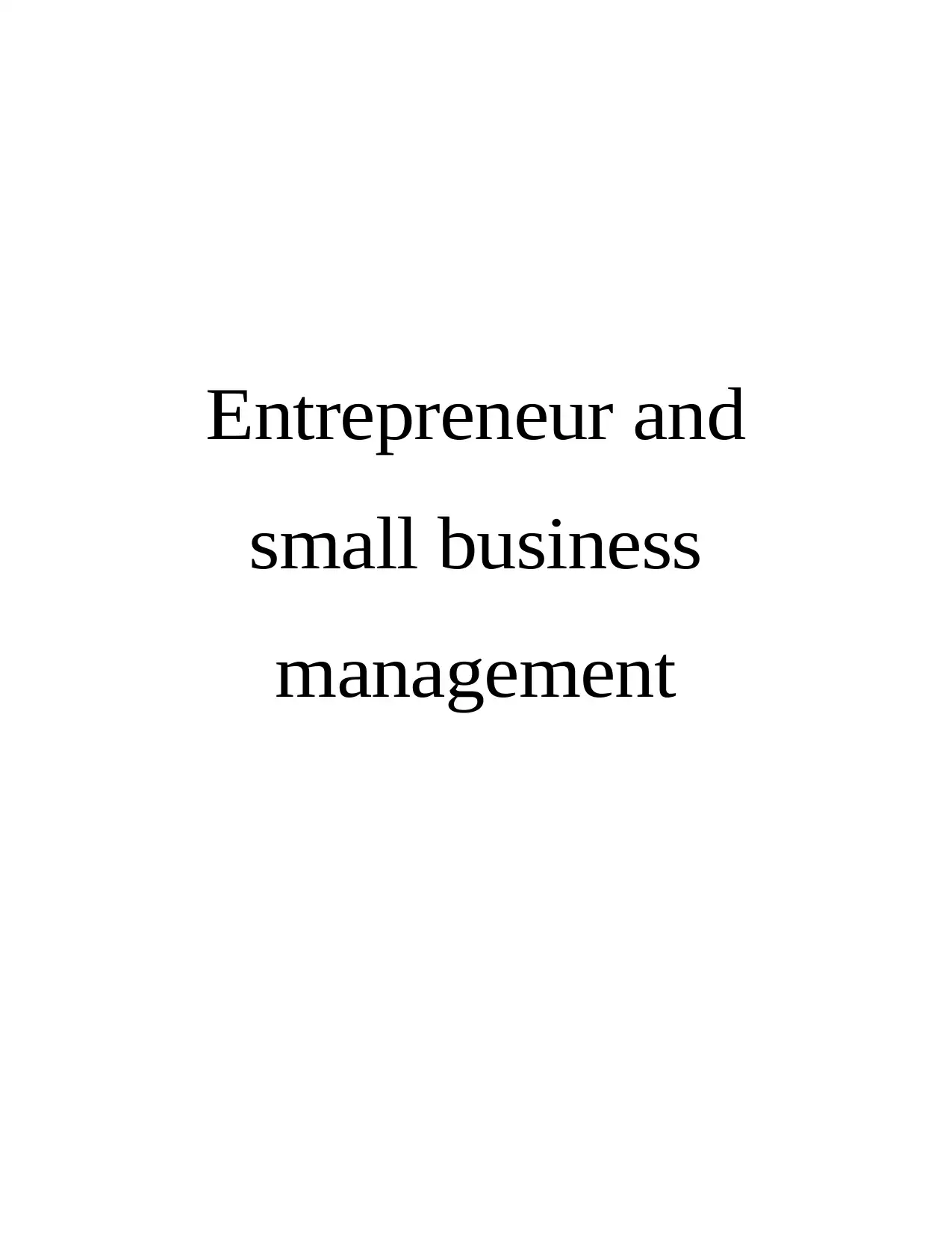
Entrepreneur and
small business
management
small business
management
Paraphrase This Document
Need a fresh take? Get an instant paraphrase of this document with our AI Paraphraser
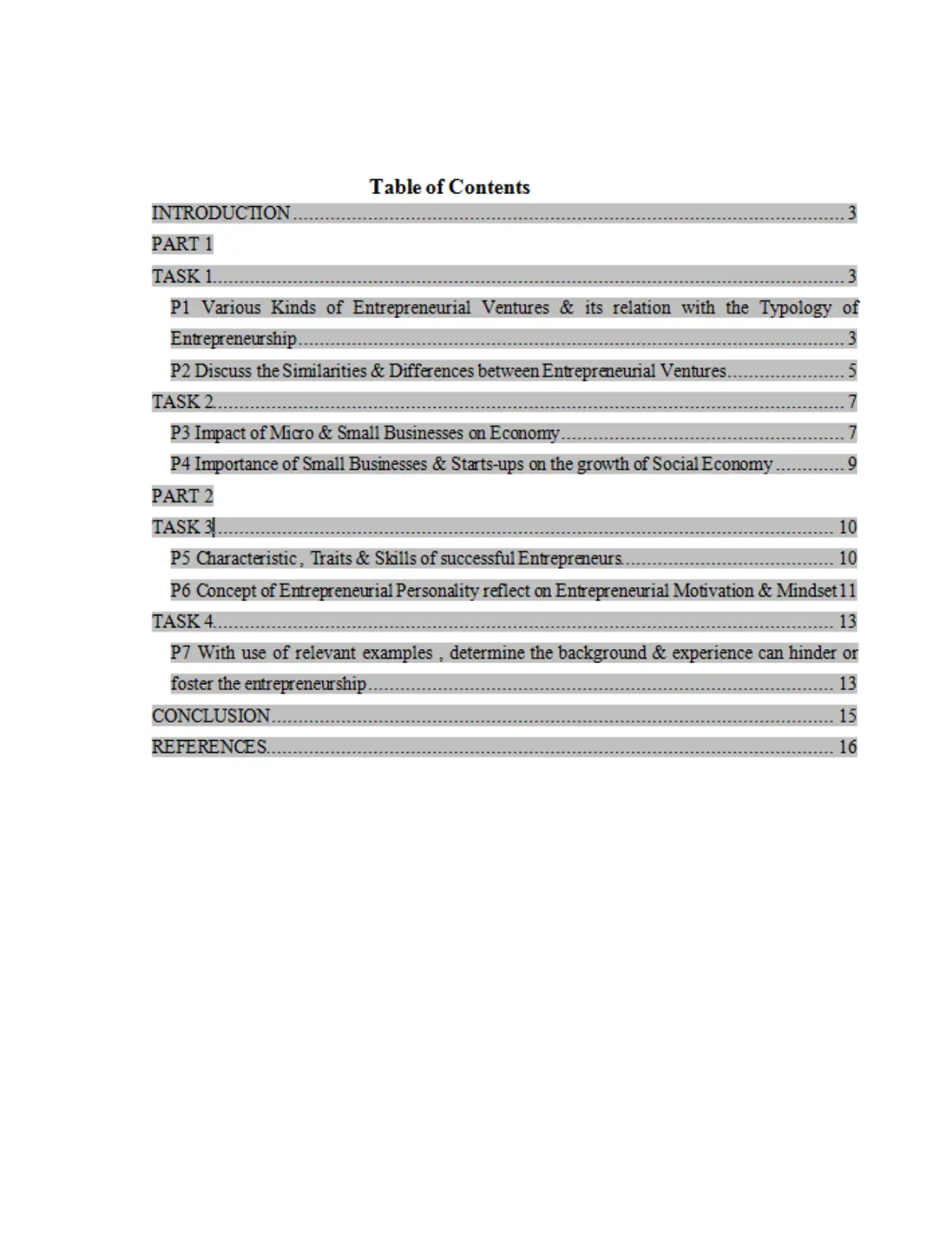
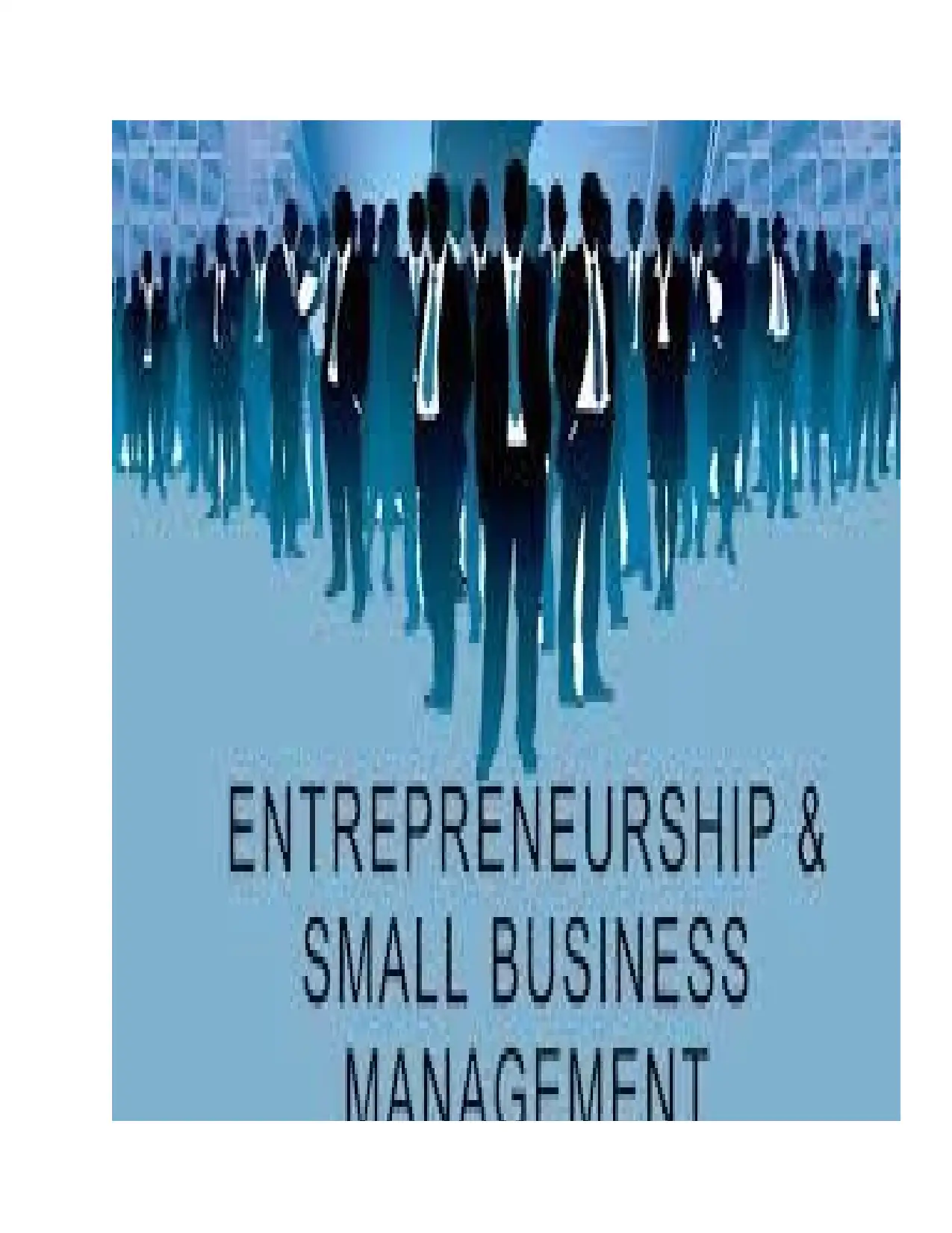
⊘ This is a preview!⊘
Do you want full access?
Subscribe today to unlock all pages.

Trusted by 1+ million students worldwide
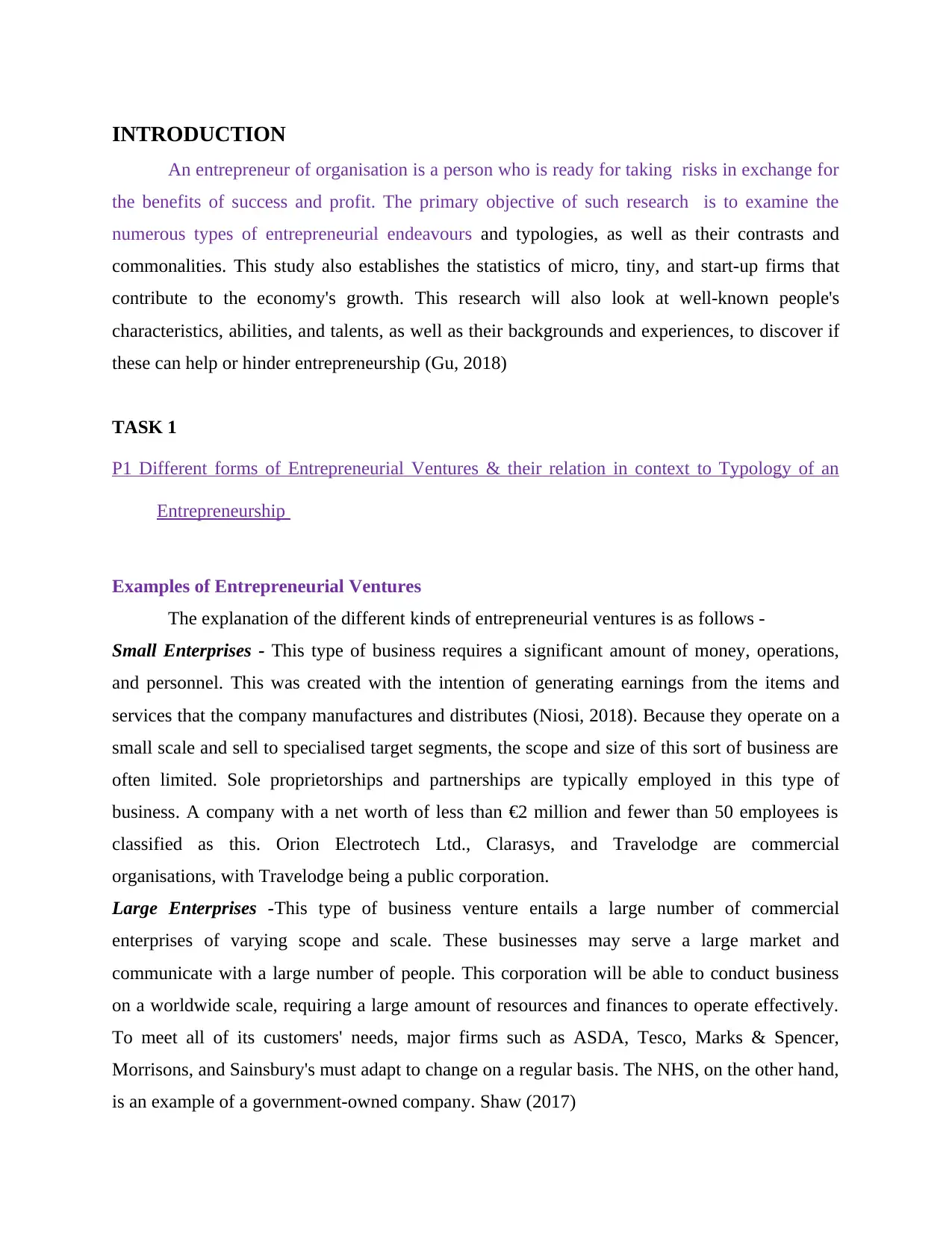
INTRODUCTION
An entrepreneur of organisation is a person who is ready for taking risks in exchange for
the benefits of success and profit. The primary objective of such research is to examine the
numerous types of entrepreneurial endeavours and typologies, as well as their contrasts and
commonalities. This study also establishes the statistics of micro, tiny, and start-up firms that
contribute to the economy's growth. This research will also look at well-known people's
characteristics, abilities, and talents, as well as their backgrounds and experiences, to discover if
these can help or hinder entrepreneurship (Gu, 2018)
TASK 1
P1 Different forms of Entrepreneurial Ventures & their relation in context to Typology of an
Entrepreneurship
Examples of Entrepreneurial Ventures
The explanation of the different kinds of entrepreneurial ventures is as follows -
Small Enterprises - This type of business requires a significant amount of money, operations,
and personnel. This was created with the intention of generating earnings from the items and
services that the company manufactures and distributes (Niosi, 2018). Because they operate on a
small scale and sell to specialised target segments, the scope and size of this sort of business are
often limited. Sole proprietorships and partnerships are typically employed in this type of
business. A company with a net worth of less than €2 million and fewer than 50 employees is
classified as this. Orion Electrotech Ltd., Clarasys, and Travelodge are commercial
organisations, with Travelodge being a public corporation.
Large Enterprises -This type of business venture entails a large number of commercial
enterprises of varying scope and scale. These businesses may serve a large market and
communicate with a large number of people. This corporation will be able to conduct business
on a worldwide scale, requiring a large amount of resources and finances to operate effectively.
To meet all of its customers' needs, major firms such as ASDA, Tesco, Marks & Spencer,
Morrisons, and Sainsbury's must adapt to change on a regular basis. The NHS, on the other hand,
is an example of a government-owned company. Shaw (2017)
An entrepreneur of organisation is a person who is ready for taking risks in exchange for
the benefits of success and profit. The primary objective of such research is to examine the
numerous types of entrepreneurial endeavours and typologies, as well as their contrasts and
commonalities. This study also establishes the statistics of micro, tiny, and start-up firms that
contribute to the economy's growth. This research will also look at well-known people's
characteristics, abilities, and talents, as well as their backgrounds and experiences, to discover if
these can help or hinder entrepreneurship (Gu, 2018)
TASK 1
P1 Different forms of Entrepreneurial Ventures & their relation in context to Typology of an
Entrepreneurship
Examples of Entrepreneurial Ventures
The explanation of the different kinds of entrepreneurial ventures is as follows -
Small Enterprises - This type of business requires a significant amount of money, operations,
and personnel. This was created with the intention of generating earnings from the items and
services that the company manufactures and distributes (Niosi, 2018). Because they operate on a
small scale and sell to specialised target segments, the scope and size of this sort of business are
often limited. Sole proprietorships and partnerships are typically employed in this type of
business. A company with a net worth of less than €2 million and fewer than 50 employees is
classified as this. Orion Electrotech Ltd., Clarasys, and Travelodge are commercial
organisations, with Travelodge being a public corporation.
Large Enterprises -This type of business venture entails a large number of commercial
enterprises of varying scope and scale. These businesses may serve a large market and
communicate with a large number of people. This corporation will be able to conduct business
on a worldwide scale, requiring a large amount of resources and finances to operate effectively.
To meet all of its customers' needs, major firms such as ASDA, Tesco, Marks & Spencer,
Morrisons, and Sainsbury's must adapt to change on a regular basis. The NHS, on the other hand,
is an example of a government-owned company. Shaw (2017)
Paraphrase This Document
Need a fresh take? Get an instant paraphrase of this document with our AI Paraphraser
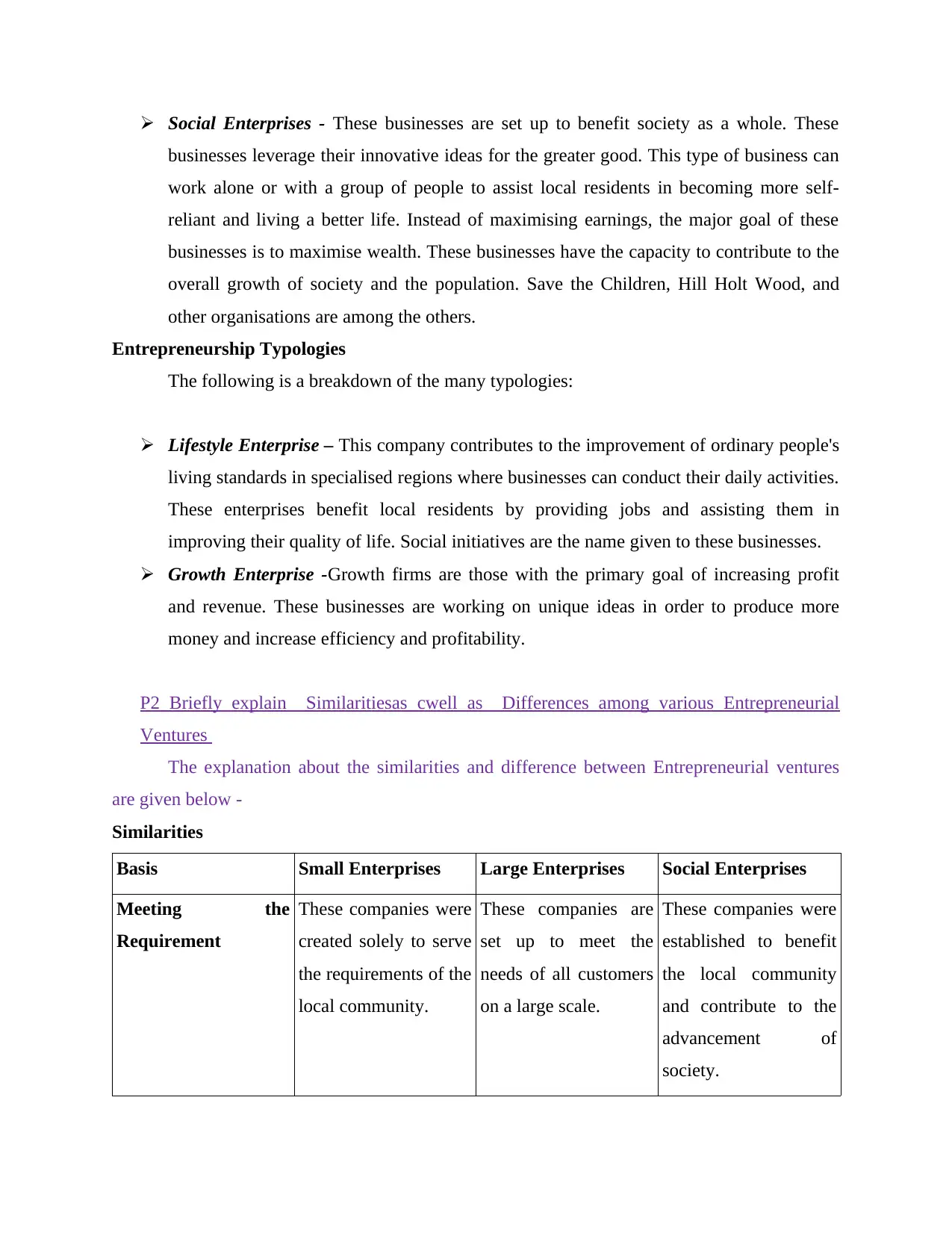
Social Enterprises - These businesses are set up to benefit society as a whole. These
businesses leverage their innovative ideas for the greater good. This type of business can
work alone or with a group of people to assist local residents in becoming more self-
reliant and living a better life. Instead of maximising earnings, the major goal of these
businesses is to maximise wealth. These businesses have the capacity to contribute to the
overall growth of society and the population. Save the Children, Hill Holt Wood, and
other organisations are among the others.
Entrepreneurship Typologies
The following is a breakdown of the many typologies:
Lifestyle Enterprise – This company contributes to the improvement of ordinary people's
living standards in specialised regions where businesses can conduct their daily activities.
These enterprises benefit local residents by providing jobs and assisting them in
improving their quality of life. Social initiatives are the name given to these businesses.
Growth Enterprise -Growth firms are those with the primary goal of increasing profit
and revenue. These businesses are working on unique ideas in order to produce more
money and increase efficiency and profitability.
P2 Briefly explain Similaritiesas cwell as Differences among various Entrepreneurial
Ventures
The explanation about the similarities and difference between Entrepreneurial ventures
are given below -
Similarities
Basis Small Enterprises Large Enterprises Social Enterprises
Meeting the
Requirement
These companies were
created solely to serve
the requirements of the
local community.
These companies are
set up to meet the
needs of all customers
on a large scale.
These companies were
established to benefit
the local community
and contribute to the
advancement of
society.
businesses leverage their innovative ideas for the greater good. This type of business can
work alone or with a group of people to assist local residents in becoming more self-
reliant and living a better life. Instead of maximising earnings, the major goal of these
businesses is to maximise wealth. These businesses have the capacity to contribute to the
overall growth of society and the population. Save the Children, Hill Holt Wood, and
other organisations are among the others.
Entrepreneurship Typologies
The following is a breakdown of the many typologies:
Lifestyle Enterprise – This company contributes to the improvement of ordinary people's
living standards in specialised regions where businesses can conduct their daily activities.
These enterprises benefit local residents by providing jobs and assisting them in
improving their quality of life. Social initiatives are the name given to these businesses.
Growth Enterprise -Growth firms are those with the primary goal of increasing profit
and revenue. These businesses are working on unique ideas in order to produce more
money and increase efficiency and profitability.
P2 Briefly explain Similaritiesas cwell as Differences among various Entrepreneurial
Ventures
The explanation about the similarities and difference between Entrepreneurial ventures
are given below -
Similarities
Basis Small Enterprises Large Enterprises Social Enterprises
Meeting the
Requirement
These companies were
created solely to serve
the requirements of the
local community.
These companies are
set up to meet the
needs of all customers
on a large scale.
These companies were
established to benefit
the local community
and contribute to the
advancement of
society.
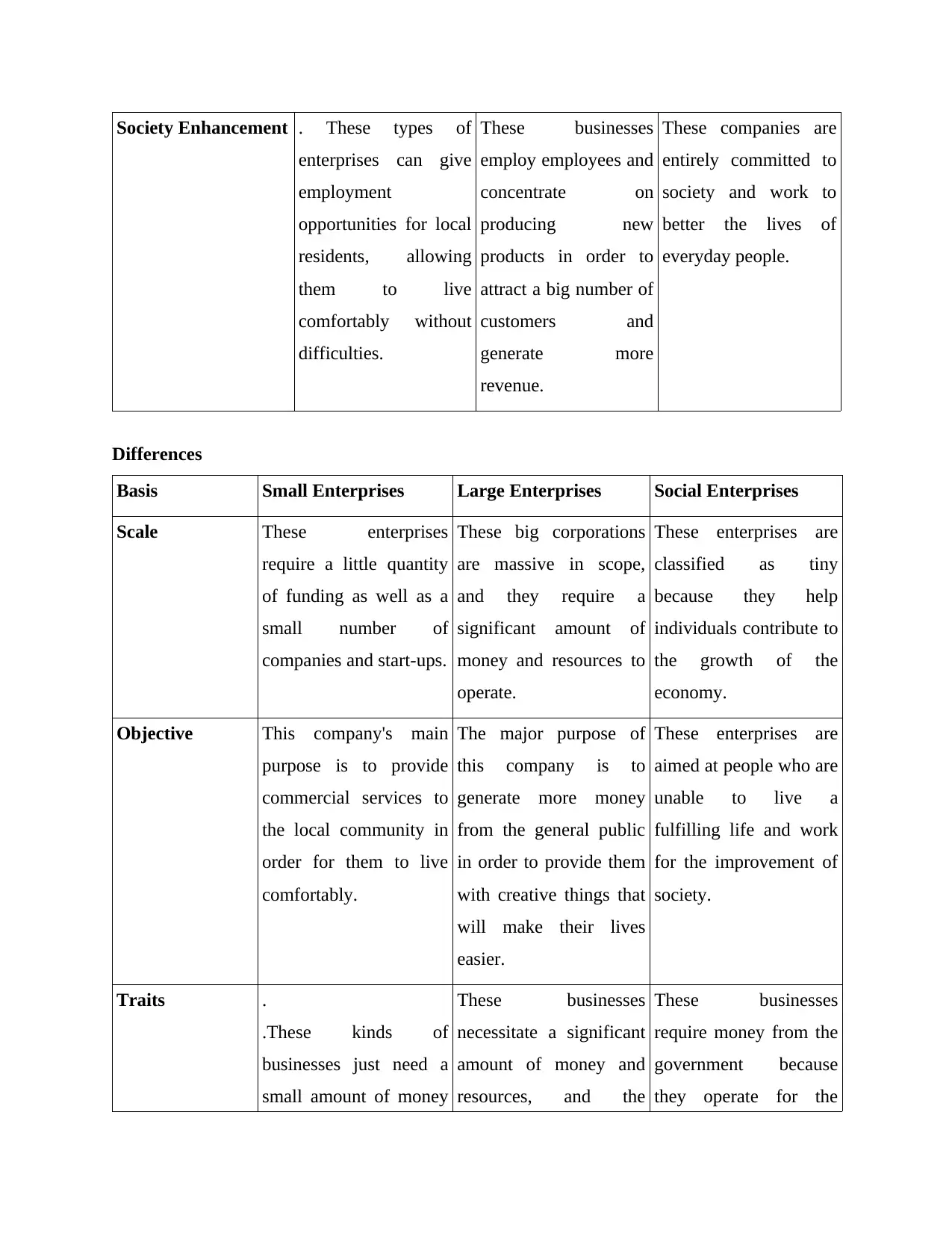
Society Enhancement . These types of
enterprises can give
employment
opportunities for local
residents, allowing
them to live
comfortably without
difficulties.
These businesses
employ employees and
concentrate on
producing new
products in order to
attract a big number of
customers and
generate more
revenue.
These companies are
entirely committed to
society and work to
better the lives of
everyday people.
Differences
Basis Small Enterprises Large Enterprises Social Enterprises
Scale These enterprises
require a little quantity
of funding as well as a
small number of
companies and start-ups.
These big corporations
are massive in scope,
and they require a
significant amount of
money and resources to
operate.
These enterprises are
classified as tiny
because they help
individuals contribute to
the growth of the
economy.
Objective This company's main
purpose is to provide
commercial services to
the local community in
order for them to live
comfortably.
The major purpose of
this company is to
generate more money
from the general public
in order to provide them
with creative things that
will make their lives
easier.
These enterprises are
aimed at people who are
unable to live a
fulfilling life and work
for the improvement of
society.
Traits .
.These kinds of
businesses just need a
small amount of money
These businesses
necessitate a significant
amount of money and
resources, and the
These businesses
require money from the
government because
they operate for the
enterprises can give
employment
opportunities for local
residents, allowing
them to live
comfortably without
difficulties.
These businesses
employ employees and
concentrate on
producing new
products in order to
attract a big number of
customers and
generate more
revenue.
These companies are
entirely committed to
society and work to
better the lives of
everyday people.
Differences
Basis Small Enterprises Large Enterprises Social Enterprises
Scale These enterprises
require a little quantity
of funding as well as a
small number of
companies and start-ups.
These big corporations
are massive in scope,
and they require a
significant amount of
money and resources to
operate.
These enterprises are
classified as tiny
because they help
individuals contribute to
the growth of the
economy.
Objective This company's main
purpose is to provide
commercial services to
the local community in
order for them to live
comfortably.
The major purpose of
this company is to
generate more money
from the general public
in order to provide them
with creative things that
will make their lives
easier.
These enterprises are
aimed at people who are
unable to live a
fulfilling life and work
for the improvement of
society.
Traits .
.These kinds of
businesses just need a
small amount of money
These businesses
necessitate a significant
amount of money and
resources, and the
These businesses
require money from the
government because
they operate for the
⊘ This is a preview!⊘
Do you want full access?
Subscribe today to unlock all pages.

Trusted by 1+ million students worldwide
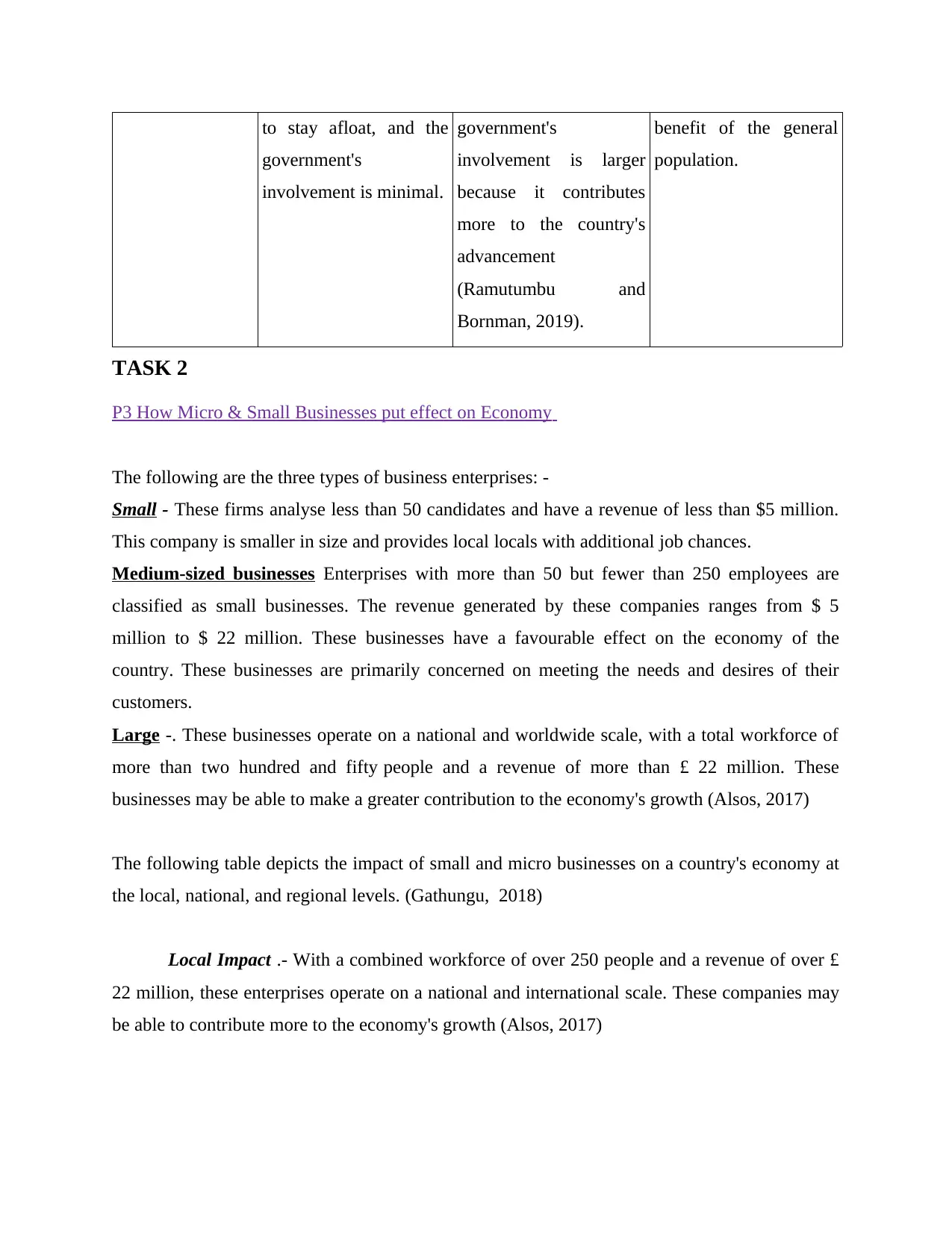
to stay afloat, and the
government's
involvement is minimal.
government's
involvement is larger
because it contributes
more to the country's
advancement
(Ramutumbu and
Bornman, 2019).
benefit of the general
population.
TASK 2
P3 How Micro & Small Businesses put effect on Economy
The following are the three types of business enterprises: -
Small - These firms analyse less than 50 candidates and have a revenue of less than $5 million.
This company is smaller in size and provides local locals with additional job chances.
Medium-sized businesses Enterprises with more than 50 but fewer than 250 employees are
classified as small businesses. The revenue generated by these companies ranges from $ 5
million to $ 22 million. These businesses have a favourable effect on the economy of the
country. These businesses are primarily concerned on meeting the needs and desires of their
customers.
Large -. These businesses operate on a national and worldwide scale, with a total workforce of
more than two hundred and fifty people and a revenue of more than £ 22 million. These
businesses may be able to make a greater contribution to the economy's growth (Alsos, 2017)
The following table depicts the impact of small and micro businesses on a country's economy at
the local, national, and regional levels. (Gathungu, 2018)
Local Impact .- With a combined workforce of over 250 people and a revenue of over £
22 million, these enterprises operate on a national and international scale. These companies may
be able to contribute more to the economy's growth (Alsos, 2017)
government's
involvement is minimal.
government's
involvement is larger
because it contributes
more to the country's
advancement
(Ramutumbu and
Bornman, 2019).
benefit of the general
population.
TASK 2
P3 How Micro & Small Businesses put effect on Economy
The following are the three types of business enterprises: -
Small - These firms analyse less than 50 candidates and have a revenue of less than $5 million.
This company is smaller in size and provides local locals with additional job chances.
Medium-sized businesses Enterprises with more than 50 but fewer than 250 employees are
classified as small businesses. The revenue generated by these companies ranges from $ 5
million to $ 22 million. These businesses have a favourable effect on the economy of the
country. These businesses are primarily concerned on meeting the needs and desires of their
customers.
Large -. These businesses operate on a national and worldwide scale, with a total workforce of
more than two hundred and fifty people and a revenue of more than £ 22 million. These
businesses may be able to make a greater contribution to the economy's growth (Alsos, 2017)
The following table depicts the impact of small and micro businesses on a country's economy at
the local, national, and regional levels. (Gathungu, 2018)
Local Impact .- With a combined workforce of over 250 people and a revenue of over £
22 million, these enterprises operate on a national and international scale. These companies may
be able to contribute more to the economy's growth (Alsos, 2017)
Paraphrase This Document
Need a fresh take? Get an instant paraphrase of this document with our AI Paraphraser
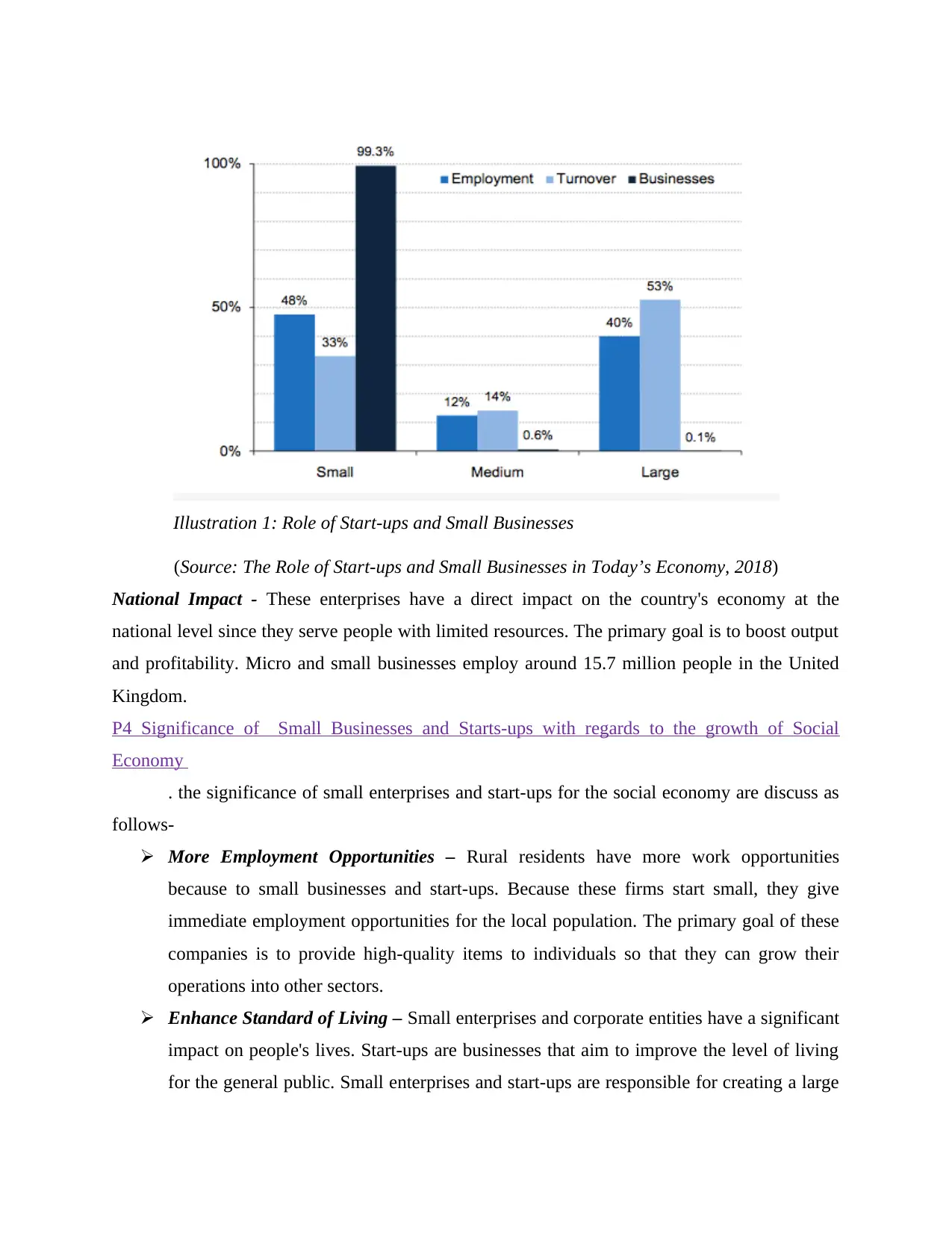
(Source: The Role of Start-ups and Small Businesses in Today’s Economy, 2018)
National Impact - These enterprises have a direct impact on the country's economy at the
national level since they serve people with limited resources. The primary goal is to boost output
and profitability. Micro and small businesses employ around 15.7 million people in the United
Kingdom.
P4 Significance of Small Businesses and Starts-ups with regards to the growth of Social
Economy
. the significance of small enterprises and start-ups for the social economy are discuss as
follows-
More Employment Opportunities – Rural residents have more work opportunities
because to small businesses and start-ups. Because these firms start small, they give
immediate employment opportunities for the local population. The primary goal of these
companies is to provide high-quality items to individuals so that they can grow their
operations into other sectors.
Enhance Standard of Living – Small enterprises and corporate entities have a significant
impact on people's lives. Start-ups are businesses that aim to improve the level of living
for the general public. Small enterprises and start-ups are responsible for creating a large
Illustration 1: Role of Start-ups and Small Businesses
National Impact - These enterprises have a direct impact on the country's economy at the
national level since they serve people with limited resources. The primary goal is to boost output
and profitability. Micro and small businesses employ around 15.7 million people in the United
Kingdom.
P4 Significance of Small Businesses and Starts-ups with regards to the growth of Social
Economy
. the significance of small enterprises and start-ups for the social economy are discuss as
follows-
More Employment Opportunities – Rural residents have more work opportunities
because to small businesses and start-ups. Because these firms start small, they give
immediate employment opportunities for the local population. The primary goal of these
companies is to provide high-quality items to individuals so that they can grow their
operations into other sectors.
Enhance Standard of Living – Small enterprises and corporate entities have a significant
impact on people's lives. Start-ups are businesses that aim to improve the level of living
for the general public. Small enterprises and start-ups are responsible for creating a large
Illustration 1: Role of Start-ups and Small Businesses
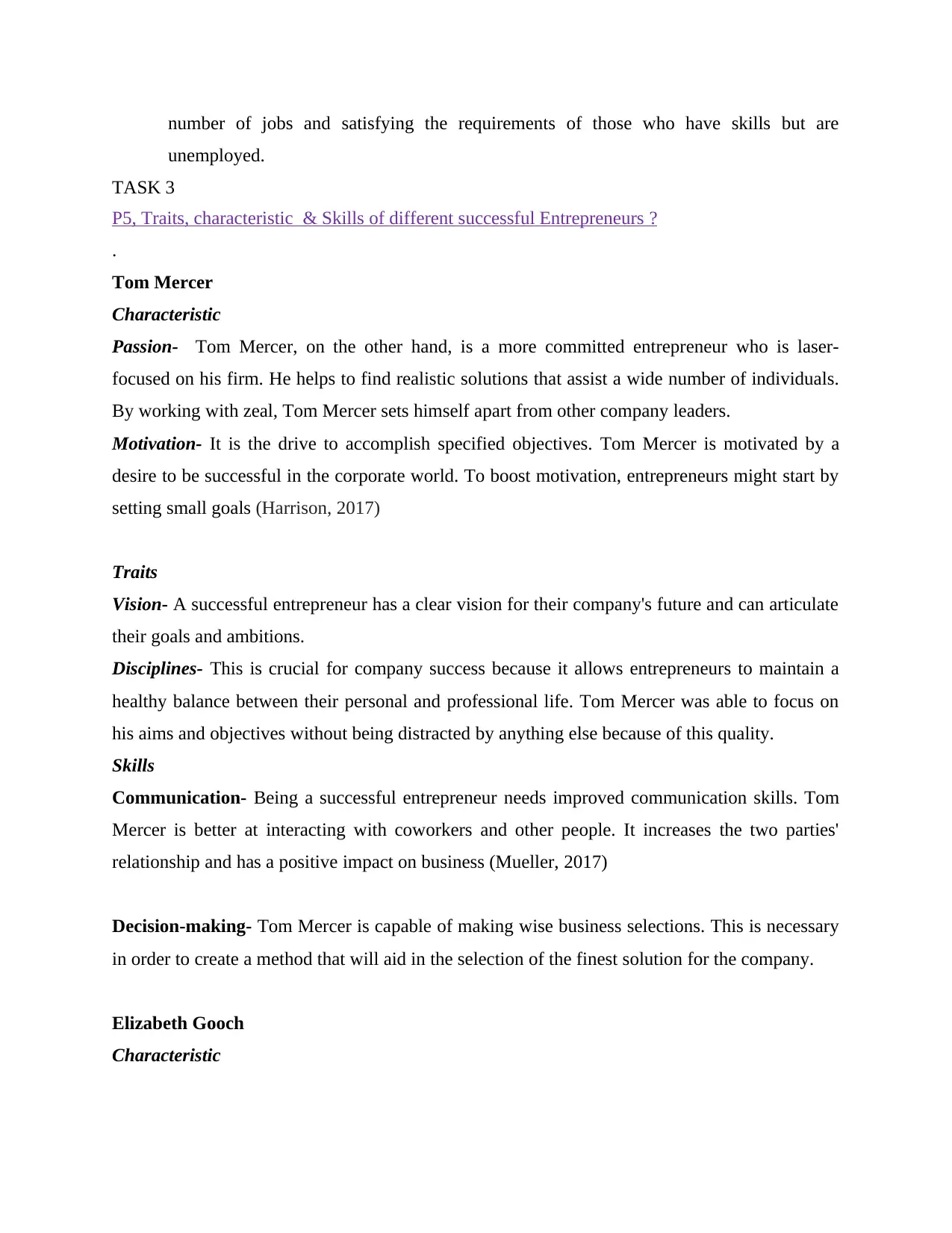
number of jobs and satisfying the requirements of those who have skills but are
unemployed.
TASK 3
P5, Traits, characteristic & Skills of different successful Entrepreneurs ?
.
Tom Mercer
Characteristic
Passion- Tom Mercer, on the other hand, is a more committed entrepreneur who is laser-
focused on his firm. He helps to find realistic solutions that assist a wide number of individuals.
By working with zeal, Tom Mercer sets himself apart from other company leaders.
Motivation- It is the drive to accomplish specified objectives. Tom Mercer is motivated by a
desire to be successful in the corporate world. To boost motivation, entrepreneurs might start by
setting small goals (Harrison, 2017)
Traits
Vision- A successful entrepreneur has a clear vision for their company's future and can articulate
their goals and ambitions.
Disciplines- This is crucial for company success because it allows entrepreneurs to maintain a
healthy balance between their personal and professional life. Tom Mercer was able to focus on
his aims and objectives without being distracted by anything else because of this quality.
Skills
Communication- Being a successful entrepreneur needs improved communication skills. Tom
Mercer is better at interacting with coworkers and other people. It increases the two parties'
relationship and has a positive impact on business (Mueller, 2017)
Decision-making- Tom Mercer is capable of making wise business selections. This is necessary
in order to create a method that will aid in the selection of the finest solution for the company.
Elizabeth Gooch
Characteristic
unemployed.
TASK 3
P5, Traits, characteristic & Skills of different successful Entrepreneurs ?
.
Tom Mercer
Characteristic
Passion- Tom Mercer, on the other hand, is a more committed entrepreneur who is laser-
focused on his firm. He helps to find realistic solutions that assist a wide number of individuals.
By working with zeal, Tom Mercer sets himself apart from other company leaders.
Motivation- It is the drive to accomplish specified objectives. Tom Mercer is motivated by a
desire to be successful in the corporate world. To boost motivation, entrepreneurs might start by
setting small goals (Harrison, 2017)
Traits
Vision- A successful entrepreneur has a clear vision for their company's future and can articulate
their goals and ambitions.
Disciplines- This is crucial for company success because it allows entrepreneurs to maintain a
healthy balance between their personal and professional life. Tom Mercer was able to focus on
his aims and objectives without being distracted by anything else because of this quality.
Skills
Communication- Being a successful entrepreneur needs improved communication skills. Tom
Mercer is better at interacting with coworkers and other people. It increases the two parties'
relationship and has a positive impact on business (Mueller, 2017)
Decision-making- Tom Mercer is capable of making wise business selections. This is necessary
in order to create a method that will aid in the selection of the finest solution for the company.
Elizabeth Gooch
Characteristic
⊘ This is a preview!⊘
Do you want full access?
Subscribe today to unlock all pages.

Trusted by 1+ million students worldwide
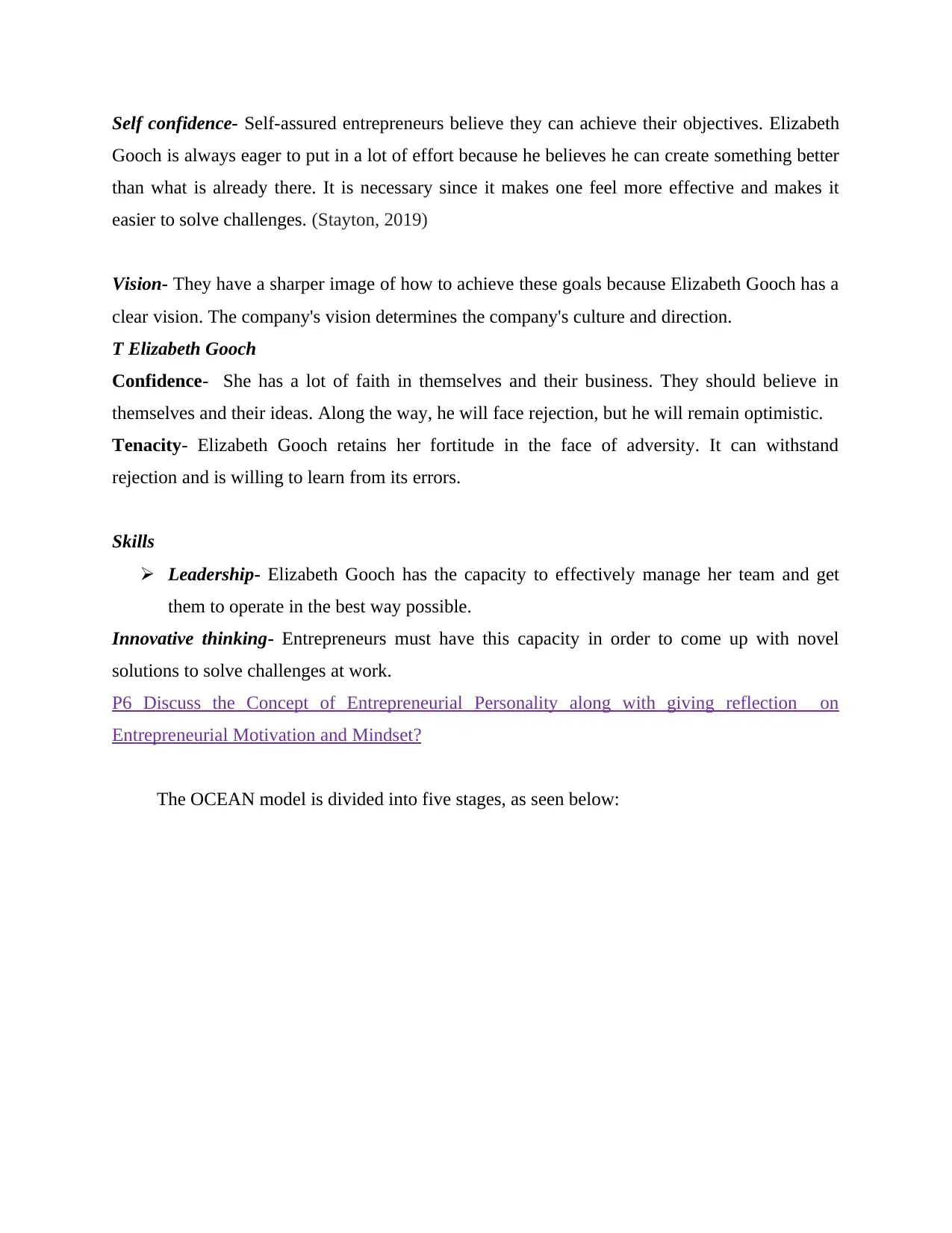
Self confidence- Self-assured entrepreneurs believe they can achieve their objectives. Elizabeth
Gooch is always eager to put in a lot of effort because he believes he can create something better
than what is already there. It is necessary since it makes one feel more effective and makes it
easier to solve challenges. (Stayton, 2019)
Vision- They have a sharper image of how to achieve these goals because Elizabeth Gooch has a
clear vision. The company's vision determines the company's culture and direction.
T Elizabeth Gooch
Confidence- She has a lot of faith in themselves and their business. They should believe in
themselves and their ideas. Along the way, he will face rejection, but he will remain optimistic.
Tenacity- Elizabeth Gooch retains her fortitude in the face of adversity. It can withstand
rejection and is willing to learn from its errors.
Skills
Leadership- Elizabeth Gooch has the capacity to effectively manage her team and get
them to operate in the best way possible.
Innovative thinking- Entrepreneurs must have this capacity in order to come up with novel
solutions to solve challenges at work.
P6 Discuss the Concept of Entrepreneurial Personality along with giving reflection on
Entrepreneurial Motivation and Mindset?
The OCEAN model is divided into five stages, as seen below:
Gooch is always eager to put in a lot of effort because he believes he can create something better
than what is already there. It is necessary since it makes one feel more effective and makes it
easier to solve challenges. (Stayton, 2019)
Vision- They have a sharper image of how to achieve these goals because Elizabeth Gooch has a
clear vision. The company's vision determines the company's culture and direction.
T Elizabeth Gooch
Confidence- She has a lot of faith in themselves and their business. They should believe in
themselves and their ideas. Along the way, he will face rejection, but he will remain optimistic.
Tenacity- Elizabeth Gooch retains her fortitude in the face of adversity. It can withstand
rejection and is willing to learn from its errors.
Skills
Leadership- Elizabeth Gooch has the capacity to effectively manage her team and get
them to operate in the best way possible.
Innovative thinking- Entrepreneurs must have this capacity in order to come up with novel
solutions to solve challenges at work.
P6 Discuss the Concept of Entrepreneurial Personality along with giving reflection on
Entrepreneurial Motivation and Mindset?
The OCEAN model is divided into five stages, as seen below:
Paraphrase This Document
Need a fresh take? Get an instant paraphrase of this document with our AI Paraphraser
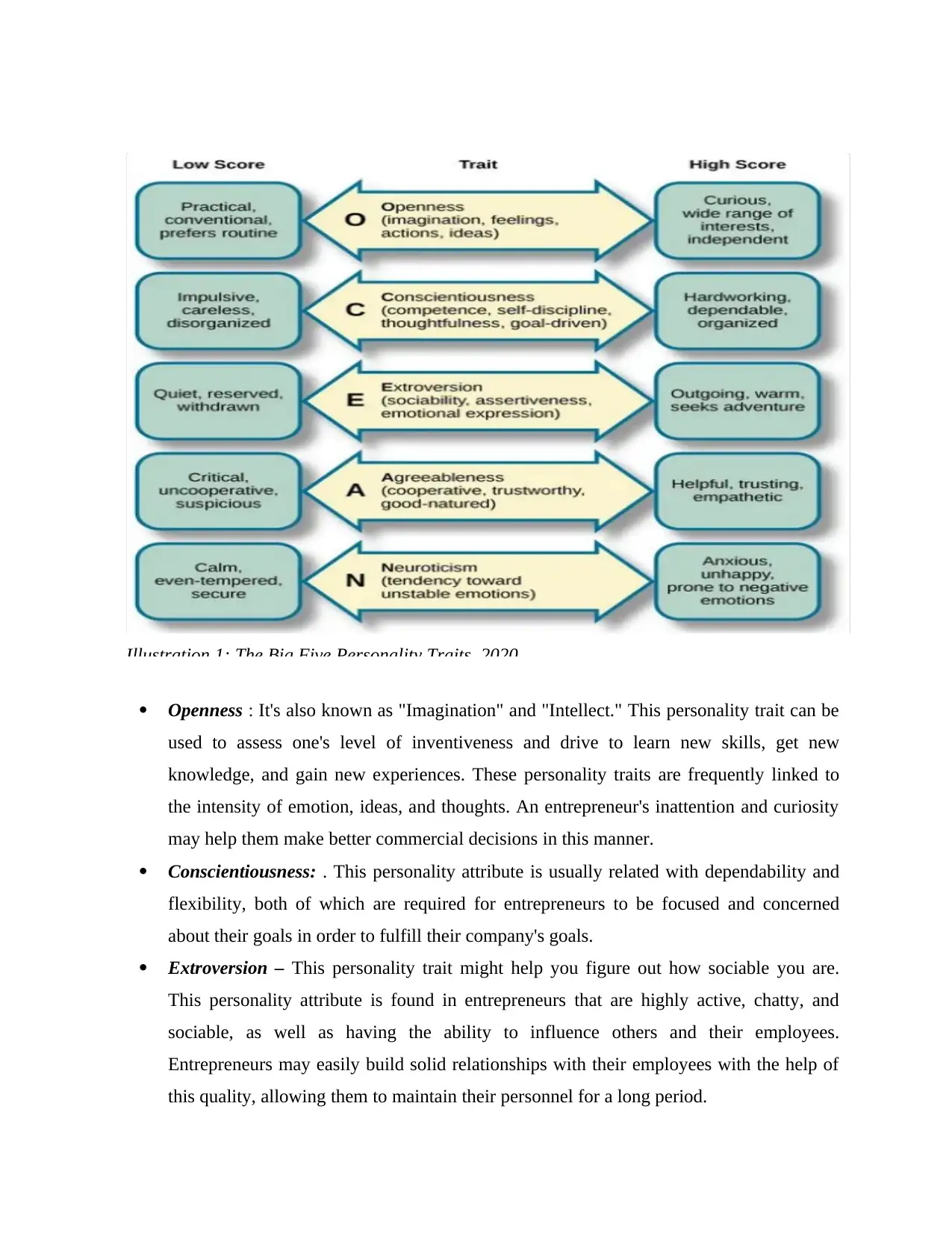
Illustration 1: The Big Five Personality Traits, 2020
Openness : It's also known as "Imagination" and "Intellect." This personality trait can be
used to assess one's level of inventiveness and drive to learn new skills, get new
knowledge, and gain new experiences. These personality traits are frequently linked to
the intensity of emotion, ideas, and thoughts. An entrepreneur's inattention and curiosity
may help them make better commercial decisions in this manner.
Conscientiousness: . This personality attribute is usually related with dependability and
flexibility, both of which are required for entrepreneurs to be focused and concerned
about their goals in order to fulfill their company's goals.
Extroversion – This personality trait might help you figure out how sociable you are.
This personality attribute is found in entrepreneurs that are highly active, chatty, and
sociable, as well as having the ability to influence others and their employees.
Entrepreneurs may easily build solid relationships with their employees with the help of
this quality, allowing them to maintain their personnel for a long period.
Openness : It's also known as "Imagination" and "Intellect." This personality trait can be
used to assess one's level of inventiveness and drive to learn new skills, get new
knowledge, and gain new experiences. These personality traits are frequently linked to
the intensity of emotion, ideas, and thoughts. An entrepreneur's inattention and curiosity
may help them make better commercial decisions in this manner.
Conscientiousness: . This personality attribute is usually related with dependability and
flexibility, both of which are required for entrepreneurs to be focused and concerned
about their goals in order to fulfill their company's goals.
Extroversion – This personality trait might help you figure out how sociable you are.
This personality attribute is found in entrepreneurs that are highly active, chatty, and
sociable, as well as having the ability to influence others and their employees.
Entrepreneurs may easily build solid relationships with their employees with the help of
this quality, allowing them to maintain their personnel for a long period.
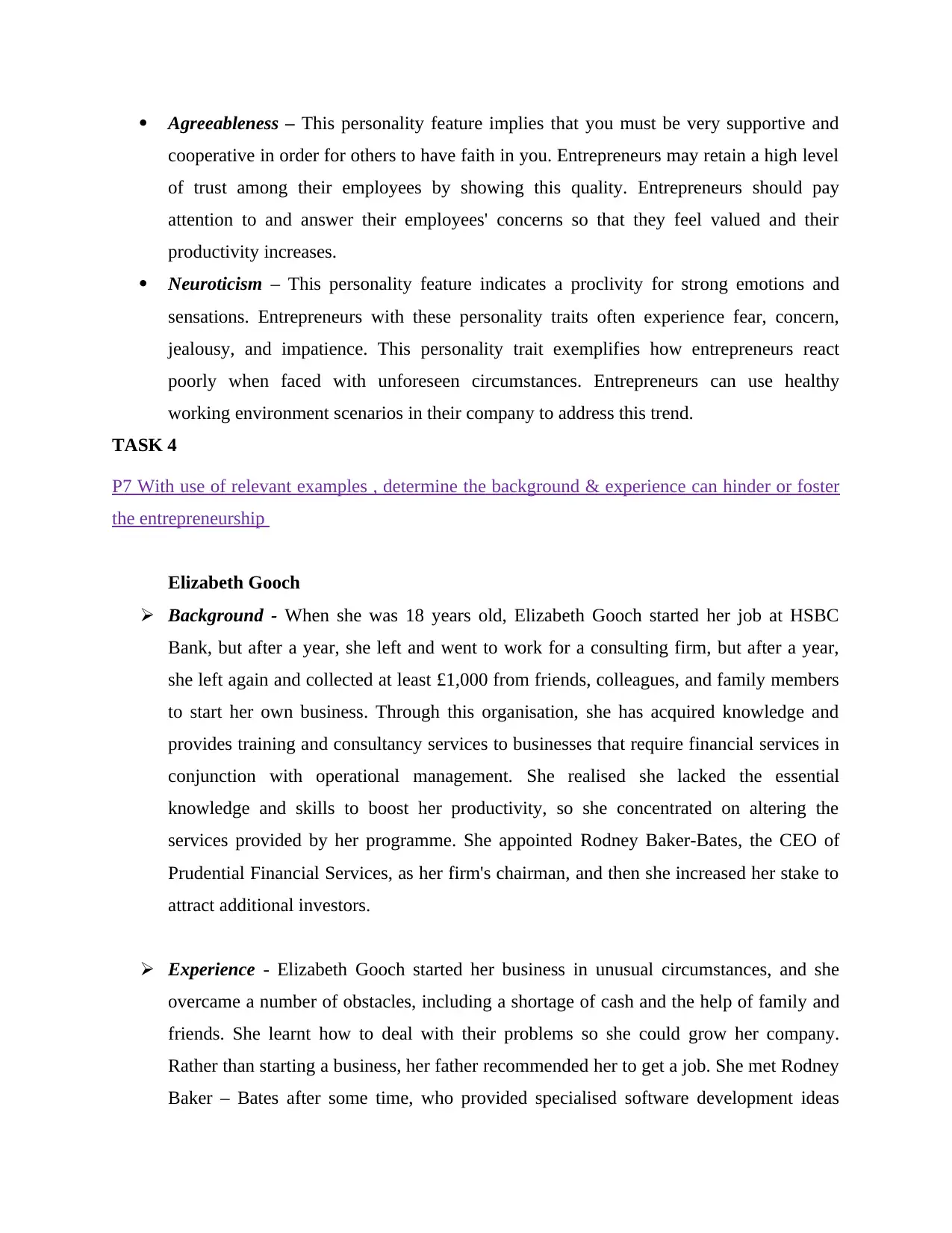
Agreeableness – This personality feature implies that you must be very supportive and
cooperative in order for others to have faith in you. Entrepreneurs may retain a high level
of trust among their employees by showing this quality. Entrepreneurs should pay
attention to and answer their employees' concerns so that they feel valued and their
productivity increases.
Neuroticism – This personality feature indicates a proclivity for strong emotions and
sensations. Entrepreneurs with these personality traits often experience fear, concern,
jealousy, and impatience. This personality trait exemplifies how entrepreneurs react
poorly when faced with unforeseen circumstances. Entrepreneurs can use healthy
working environment scenarios in their company to address this trend.
TASK 4
P7 With use of relevant examples , determine the background & experience can hinder or foster
the entrepreneurship
Elizabeth Gooch
Background - When she was 18 years old, Elizabeth Gooch started her job at HSBC
Bank, but after a year, she left and went to work for a consulting firm, but after a year,
she left again and collected at least £1,000 from friends, colleagues, and family members
to start her own business. Through this organisation, she has acquired knowledge and
provides training and consultancy services to businesses that require financial services in
conjunction with operational management. She realised she lacked the essential
knowledge and skills to boost her productivity, so she concentrated on altering the
services provided by her programme. She appointed Rodney Baker-Bates, the CEO of
Prudential Financial Services, as her firm's chairman, and then she increased her stake to
attract additional investors.
Experience - Elizabeth Gooch started her business in unusual circumstances, and she
overcame a number of obstacles, including a shortage of cash and the help of family and
friends. She learnt how to deal with their problems so she could grow her company.
Rather than starting a business, her father recommended her to get a job. She met Rodney
Baker – Bates after some time, who provided specialised software development ideas
cooperative in order for others to have faith in you. Entrepreneurs may retain a high level
of trust among their employees by showing this quality. Entrepreneurs should pay
attention to and answer their employees' concerns so that they feel valued and their
productivity increases.
Neuroticism – This personality feature indicates a proclivity for strong emotions and
sensations. Entrepreneurs with these personality traits often experience fear, concern,
jealousy, and impatience. This personality trait exemplifies how entrepreneurs react
poorly when faced with unforeseen circumstances. Entrepreneurs can use healthy
working environment scenarios in their company to address this trend.
TASK 4
P7 With use of relevant examples , determine the background & experience can hinder or foster
the entrepreneurship
Elizabeth Gooch
Background - When she was 18 years old, Elizabeth Gooch started her job at HSBC
Bank, but after a year, she left and went to work for a consulting firm, but after a year,
she left again and collected at least £1,000 from friends, colleagues, and family members
to start her own business. Through this organisation, she has acquired knowledge and
provides training and consultancy services to businesses that require financial services in
conjunction with operational management. She realised she lacked the essential
knowledge and skills to boost her productivity, so she concentrated on altering the
services provided by her programme. She appointed Rodney Baker-Bates, the CEO of
Prudential Financial Services, as her firm's chairman, and then she increased her stake to
attract additional investors.
Experience - Elizabeth Gooch started her business in unusual circumstances, and she
overcame a number of obstacles, including a shortage of cash and the help of family and
friends. She learnt how to deal with their problems so she could grow her company.
Rather than starting a business, her father recommended her to get a job. She met Rodney
Baker – Bates after some time, who provided specialised software development ideas
⊘ This is a preview!⊘
Do you want full access?
Subscribe today to unlock all pages.

Trusted by 1+ million students worldwide
1 out of 17
Related Documents
Your All-in-One AI-Powered Toolkit for Academic Success.
+13062052269
info@desklib.com
Available 24*7 on WhatsApp / Email
![[object Object]](/_next/static/media/star-bottom.7253800d.svg)
Unlock your academic potential
Copyright © 2020–2026 A2Z Services. All Rights Reserved. Developed and managed by ZUCOL.



